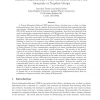82 search results - page 13 / 17 » Deciding knowledge properties of security protocols |
PODC
2011
ACM
13 years 19 days ago
2011
ACM
We present a cryptographic framework to achieve access control, privacy of social relations, secrecy of resources, and anonymity of users in social networks. The main idea is to u...
CRYPTO
2003
Springer
14 years 3 months ago
2003
Springer
We revisit the definitions of zero-knowledge in the Common Reference String (CRS) model and the Random Oracle (RO) model. We argue that even though these definitions syntacticall...
TCC
2009
Springer
14 years 10 months ago
2009
Springer
The concept of witness-hiding suggested by Feige and Shamir is a natural relaxation of zero-knowledge. In this paper we identify languages and distributions for which many known co...
MDM
2010
Springer
14 years 2 months ago
2010
Springer
—The support of distributed atomic transactions in mobile ad-hoc networks (MANET) is a key requirement for many mobile application scenarios. Atomicity is a fundamental property ...
ISW
2010
Springer
13 years 7 months ago
2010
Springer
A Private Information Retrieval (PIR) protocol allows a database user, or client, to obtain information from a data- base in a manner that prevents the database from knowing which...

